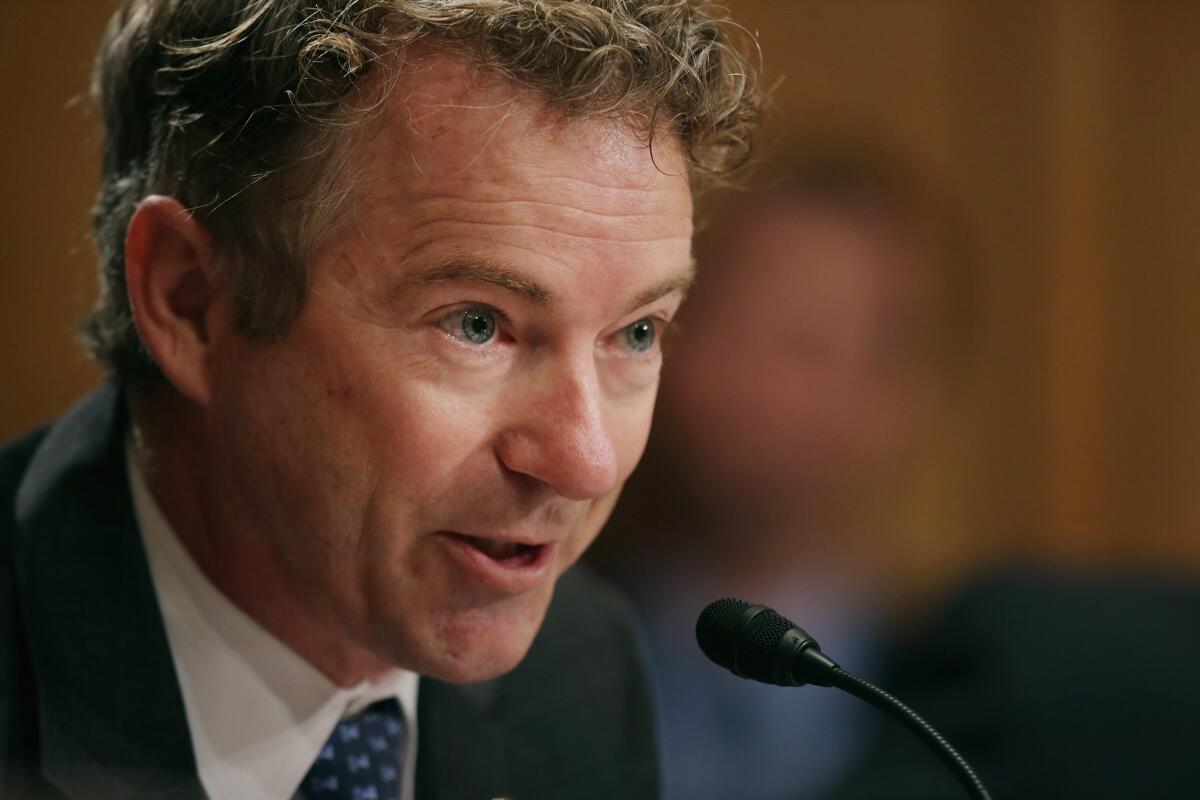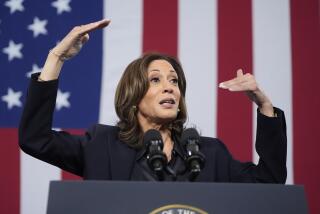Kentucky Sen. Rand Paul visits black leaders in Ferguson, Mo.

Reporting from St. Louis — U.S. Sen. Rand Paul met with local NAACP leaders for breakfast in the heart of the tense suburb of Ferguson on Friday morning to talk about how he could help the community, according to one official in attendance.
The Kentucky Republican and likely 2016 presidential candidate, who has been a vocal opponent of the “militarization” of police with tactical equipment often supplied by the federal government, told attendees that the Republican Party had “left the African American community behind,” said John Gaskin, a spokesman for the St. Louis County chapter of the National Assn. for the Advancement of Colored People.
The meeting came about at the request of Paul’s office, which contacted NAACP officials in Washington asking about a visit to Ferguson, Gaskin told the Los Angeles Times.
“We had a very thought-provoking conversation to support our efforts on the ground,” Gaskin said, with Paul talking about his idea for “economic freedom zones” that would reduce regulations in economically hard-hit cities such as Detroit.
“We can help advance your community,” Gaskin quoted Paul as saying.
Gaskin’s recounting of Paul’s remarks echoes previous statements on the party and the African American community.
A spokesman for Paul said the visit reflected the senator’s “engagement of all groups.”
“In the past year Sen. Paul has spoken at diverse places from UC Berkeley to Detroit and from Chicago to Silicon Valley. Sen. Paul will continue to engage every group in America’” said Sergio Gor.
Gaskin said Paul talked “very heavily” on the issue of police militarization, which had also drawn the scrutiny of Missouri’s Democratic U.S. Sen. Claire McCaskill.
Paul’s visit comes as several law-and-order Missouri Democrats, at various levels, have come under local criticism since the Aug. 9 shooting death of 18-year-old Michael Brown by a Ferguson police officer. Some accused Gov. Jay Nixon of moving too slowly in the early days of unrest, and demonstrators have repeatedly asked longtime Democratic St. Louis County Prosecutor Bob McCulloch to step aside as a grand jury investigates Ferguson officer Darren Wilson’s role in the shooting. (Another demonstration was planned outside McCulloch’s office on Friday afternoon.)
One of Wilson’s most vocal supporters has been Missouri state Rep. Jeff Roorda, a Democrat who is running for the state Senate and who has receiving fundraising support from Nixon since the shooting.
Last week, a coalition of black St. Louis Democrats split from their party to endorse a white Republican, Rick Stream, in the race for country executive. Those Democrats cited longstanding inattentiveness from party leaders, but the Democrat in the race has come under fire for supporting McCulloch.
Other prominent Missouri Democrats, including McCaskill, Atty. Gen. Chris Koster and Secretary of State Jason Kander, have visited the community, and they expressed support in the early days after the shooting.
Gaskin, of the county NAACP, said Koster and Kander were among the officials who had been “reaching out really on a weekly basis” to check in.
Gaskin said he’d been encouraged by the official attention, including Paul’s visit, which was held at an African American-owned real estate firm a block from Ferguson’s police station.
“We want to continue this conversation when it’s no longer a national news story,” he said.
Paul has made a point of traveling around the country to locations not typically visited by Republicans and pressing the case that to survive long-term, Republicans need to expand their reach into minority communities.
In an interview at the recent state Republican convention in Los Angeles, he cited the need for investment in urban areas and the loosening of some drug sentences as issues Republicans could use to gain support in previously Democratic environs.
On Twitter: @mattdpearce
More to Read
Get the L.A. Times Politics newsletter
Deeply reported insights into legislation, politics and policy from Sacramento, Washington and beyond. In your inbox three times per week.
You may occasionally receive promotional content from the Los Angeles Times.











